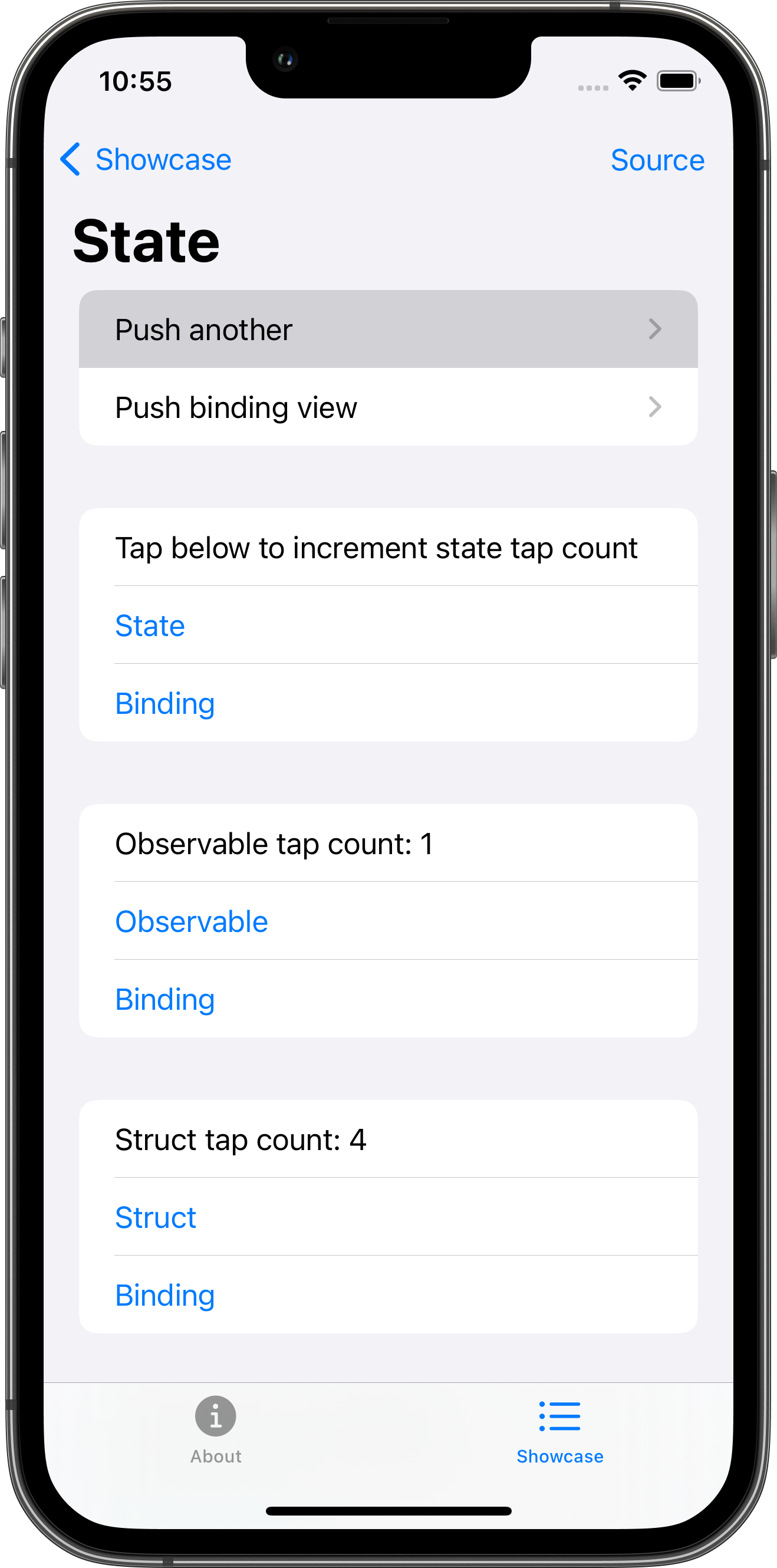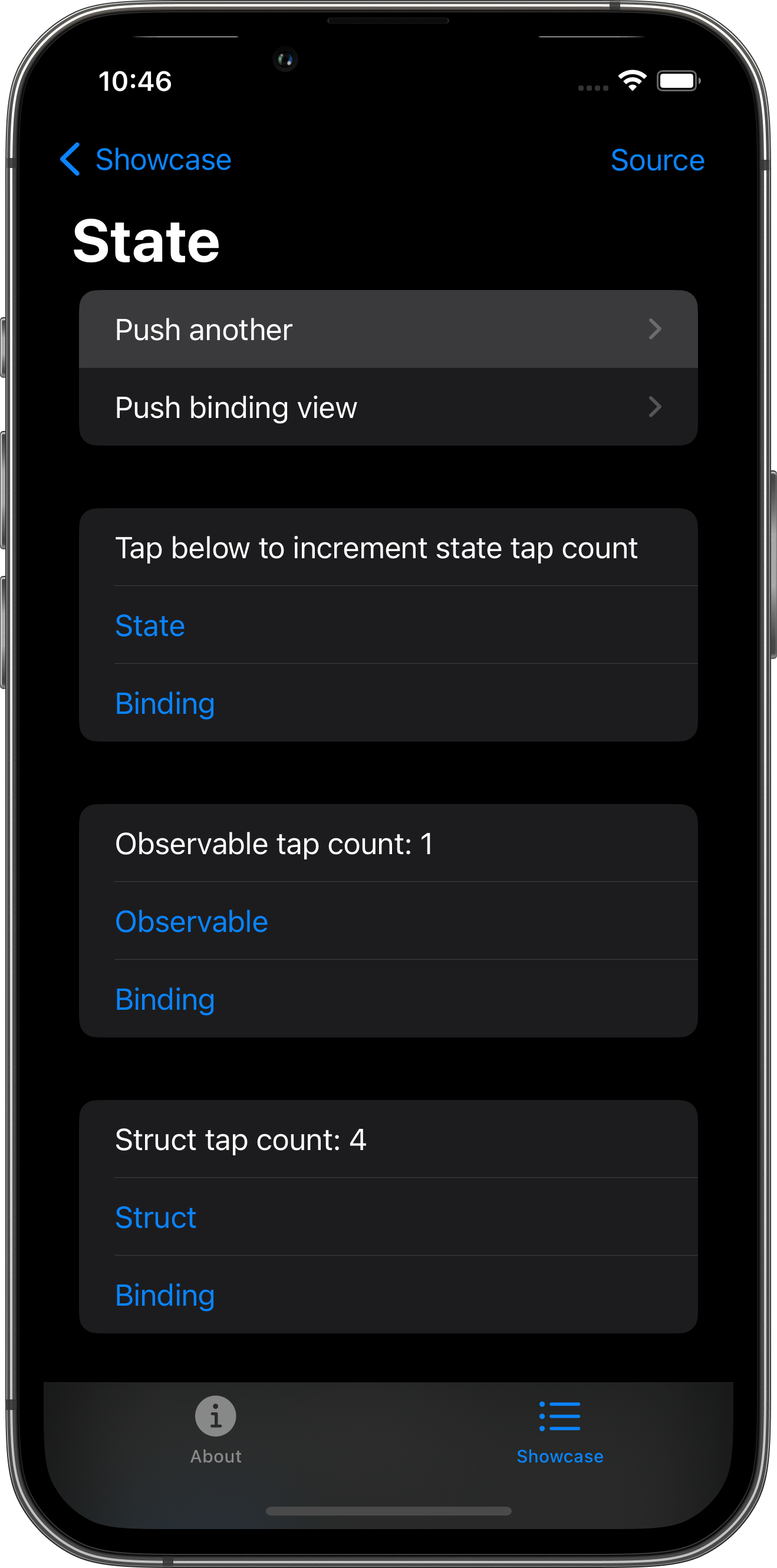State
Skip support for SwiftUI State on Android. Consult the SkipUI module for a complete list of supported SwiftUI.
The following example screens and source code is from SkipUI’s
Showcase sample app
StatePlayground.swift




import SwiftUI
class TapCountObservable: ObservableObject {
@Published var tapCount = 0
}
struct TapCountStruct : Identifiable {
var id = 0
var tapCount = 0
}
class TapCountRepository: ObservableObject {
@Published var items: [TapCountStruct] = []
func add() {
items.append(TapCountStruct(id: items.count))
}
func increment() {
if !items.isEmpty {
items[items.count - 1].tapCount += 1
}
}
}
struct StatePlayground: View {
@State var tapCount = 0
@State var hasStateTapped: Bool? // Test optional vars
@StateObject var tapCountObservable: TapCountObservable
@State var tapCountStruct: TapCountStruct
@StateObject var tapCountRepository = TapCountRepository() // Test ForEach observable
init() {
// Test that we can initialze state property wrappers
_tapCountObservable = StateObject(wrappedValue: TapCountObservable())
_tapCountStruct = State(wrappedValue: TapCountStruct())
}
var body: some View {
List {
Section {
NavigationLink("Push another", value: PlaygroundType.state)
NavigationLink("Push binding view") {
StatePlaygroundDestinationBindingView(tapCount: $tapCount)
}
}
Section {
if hasStateTapped == true {
Text("State tap count: \(tapCount)")
} else {
Text("Tap below to increment state tap count")
}
Button("State") {
tapCount += 1
hasStateTapped = true
}
StatePlaygroundBindingView(tapCount: $tapCount)
}
Section {
Text("Observable tap count: \(tapCountObservable.tapCount)")
Button("Observable") {
tapCountObservable.tapCount += 1
}
StatePlaygroundBindingView(tapCount: $tapCountObservable.tapCount)
}
Section {
Text("Struct tap count: \(tapCountStruct.tapCount)")
Button("Struct") {
tapCountStruct.tapCount += 1
}
StatePlaygroundStructBindingView(tapCountStruct: $tapCountStruct)
}
Section {
Text("Struct tap count (field): \(tapCountStruct.tapCount)")
Button("Struct (field)") {
tapCountStruct.tapCount += 1
}
StatePlaygroundBindingView(tapCount: $tapCountStruct.tapCount)
}
Section {
ForEach(tapCountRepository.items) { item in
Text("Repository item tap count: \(item.tapCount)")
}
Button("Add item") { tapCountRepository.add() }
Button("Increment last") { tapCountRepository.increment() }
}
}
.onChange(of: tapCount) {
logger.log("onChange(of: tapCount): \($0)")
}
.onChange(of: tapCountObservable.tapCount) {
logger.log("onChange(of: tapCountObservable.tapCount): \($0)")
}
.onChange(of: tapCountStruct.tapCount) {
logger.log("onChange(of: tapCountStruct.tapCount): \($0)")
}
.toolbar {
PlaygroundSourceLink(file: "StatePlayground.swift")
}
}
}
struct StatePlaygroundBindingView: View {
@Binding var tapCount: Int
var body: some View {
Button("Binding") {
tapCount += 1
}
}
}
struct StatePlaygroundStructBindingView: View {
@Binding var tapCountStruct: TapCountStruct
var body: some View {
Button("Binding") {
tapCountStruct.tapCount += 1
}
}
}
struct StatePlaygroundDestinationBindingView: View {
@Binding var tapCount: Int
var body: some View {
VStack {
SubView1(tapCount: _tapCount)
SubView2(tapCount: _tapCount)
}
.navigationTitle("Binding View")
}
struct SubView1: View {
@Binding var tapCount: Int
var body: some View {
Button("Bound tap count 1: \(tapCount)") {
tapCount += 1
}
.buttonStyle(.bordered)
}
}
struct SubView2: View {
@Binding var tapCount: Int
var body: some View {
Button("Bound tap count 2: \(tapCount)") {
tapCount += 1
}
.buttonStyle(.bordered)
}
}
}